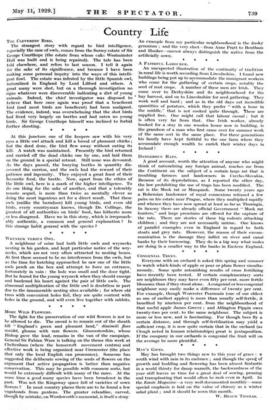At this juncture one of the keepers saw with his
very eyes a little owl attack and kill a brood of pheasant chicks ; but the deed done, the bird flew away without eating its kill. A watch was maintained. Presently the bird returned and carried off the dead chicks one by one, and laid them on the grouhd in a special retreat. Still none was devoured: As the days passed, the burying beetles in quantity dis- Covered the carrion, and the owlii had the reward of their patience and ingenuitY.. They enjoyed 'a great feast of their favourite food, the beetle. Now, apart from the ethics of the little owl, here is a mark of the higher intelligence. To do one thing for the sake of another, and that a tolerably remote sequel, is more than twice as mentally clever as doing the most ingenious act for a direct result. That these owls (unlike the barndoor) kill young birds, and even old birds, every countryman knows, though Dr. Collinge, the greatest of all authorities on birds' food, has hitherto more or less disagreed. Have we in this story, which is irreproach- ably authentic, a common and general explanation ? Is this strange habit general with the species ?
* * *










































 Previous page
Previous page